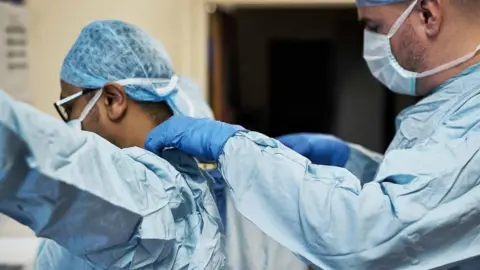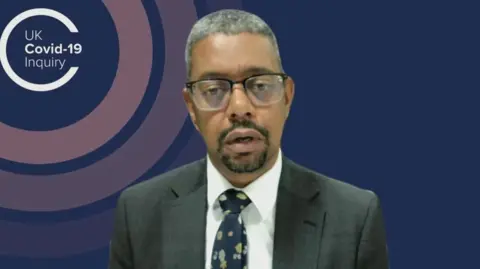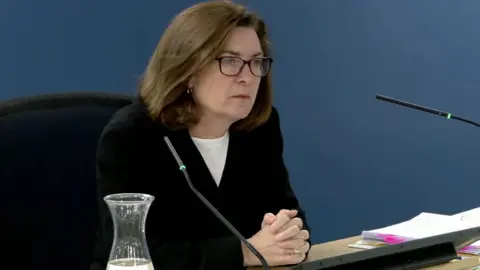NHS staff 'may have treated Covid with poor PPE'
 Getty Images
Getty ImagesA former Welsh health minister has said that NHS staff may have treated Covid patients during the pandemic with inadequate PPE.
Former first minister Vaughan Gething, who was in charge of the health service from 2016 to 2021, returned to the Covid inquiry to give evidence on Wednesday.
The inquiry heard that early PPE stocks ran out weeks faster than anticipated, and some eye wear had to be binned.
"Shysters," Gething said, also saw an "unscrupulous business opportunity" in making money from inadequate kit.
The Welsh Conservatives said the evidence painted a "picture of a completely unacceptable situation for NHS staff in Wales".
Plaid Cymru said the frontline NHS was "significantly let down by the actions of the Labour Welsh government" when "doctors and nurses were putting themselves at risk".
The inquiry also heard from First Minister Eluned Morgan, who said if she had her time again she would have “definitely” acted sooner to change the guidance around birthing partners visiting hospital.
 PA Media
PA MediaAn email from a consultant at Prince Charles Hospital on 24 March 2020 said there was “complete chaos at our hospital" with "no protection for nurses" and "very low morale”.
Masks were “not being released”, the consultant said.
The inquiry heard a school made masks and hand gel for a pharmacist, while trade unions said workers resorted to wearing bin bags and buying their own goggles and even hair bands to hook poorly fitted face masks.
Inquiry counsel Jacqueline Carey asked Gething whether he accepted that at times during the first wave in 2020 "it appears healthcare workers in Wales treated Covid-19 patients with inadequate PPE, at potential risk for their own health?”
“I’m afraid that’s possible, yes," he replied.
Gething was health minister for the first year of the pandemic, his term ending shortly after the May 2021 Senedd election.
He served as first minister for part of 2024, until he was forced to resign following a row over political donations.
Gerhing said that while Wales did not run out at a national level, there were “some very real challenges in distribution”.
Ms Carey asked the ex-health minister, who is now a backbencher, whether the Welsh NHS “didn’t have the right PPE, or didn’t have enough of the right PPE”.
“I think there’s a bit of both," Gething said.
Some eye protectors, he said, “were just not fit for purpose”.
“Some of them had to be destroyed, which is not at all comfortable, and that was from the pandemic stock”.
Stocks had been planned to last 15 weeks but were used much quicker. Glove stocks, in particular, lasted one and a half weeks.
“Once we got on top of gloves, aprons were a bigger issue,” Gething said, saying it took up a “significant portion of my time as a minister”.
Gething said there were also “an awful lot of shysters who were trying to make money out of inadequate equipment”.
“The whole world wanted more, and some people saw that as an unscrupulous business opportunity."
The session also looked at claims that some with Covid were not admitted to critical care.
A doctor had told inquiry researchers there was not enough space to give people who had a very remote chance of getting better "a go”.
He said: “We knew it wouldn’t help because we had come to see what kind of people died of this disease despite escalated care. So we decided not to admit to critical care, whereas had they had a different illness they probably would have been more likely to benefit so we would have escalated.”
Gething said the example was “very upsetting to read”.
He said he had known “heart-breaking choices were being made,” but said he had not been aware of the specific claim.
 PA Media
PA MediaFirst Minister Eluned Morgan told the inquiry that “if I had my time again” she would “definitely” have acted sooner to change the guidance around birthing partners visiting hospital.
Morgan succeeded Gething as health minister in May 2021, and did the job until she became first minister in August.
The guidance was updated on 9 May 2022 so that birthing partners were to be counted as partners in care rather than visitors.
This was more than a year after the distinction was made in England.
Eluned Morgan said she “took too long” to change Welsh guidance: “If I had my time again... that’s one of the things I definitely would have changed.”
She said: “I think it's a magical time for parents, and you need to allow them to be parents as soon as they can, irrespective of the circumstances.
“So although we may have been doing it for what we thought were the right reasons, there's a price that they've paid that they'll never get back.”
Hospital infections
In her evidence the first minister defended the decision not to hold a national investigation into hospital-acquired infections.
Giving evidence on Wednesday afternoon, Morgan said more than 18,630 individual cases were investigated by health boards and they "could not have been more thorough".
She said it was difficult to single out a cause as there were "lots of causes".
Morgan was asked if the suggestion that health boards could be facing civil claims from patients and families of up to £69m was a factor.
She said it was "not a focus of mine" and said their focus was more on learning lessons.
Morgan conceded that restarting routine surgery could have been planned earlier.
But she was unsure it could have been implemented, given the pressures the systems were under.
She also told the inquiry that, on an unplanned visit to an orthopaedic hub, she found that there were 13 surgeons not working.
"They weren't there," she said. "So, the monitoring, the management was not happening in the way that it should have been happening."
She said people needed to be held to account and she did not receive a satisfactory explanation. She took steps afterwards to make it clear that "things had to change".
Morgan added that private healthcare did not give much capacity to deal with the backlog, with only 172 private beds available.
Some were used - as were private beds across the border in England.
The situation in NHS England was different, where they were able to clear 18% of their backlog by using the private sector.
Gething said he was prepared to “quite possibly” accept that he might have acted earlier in setting up a group in May 2020 to tackle hospital-acquired infections.
By the end of March, there had been a cluster outbreak in Aneurin Bevan health board in south east Wales.
By November 2020, the early weeks of the second wave, 3.5% of patients were being infected each week. One health board reported 24% of staff had Covid.
Gething stressed the challenges of the more transmissible variant of Covid from February 2021.
But he said there was “no sugar coating that the situation got worse and real harm was caused”.
Additional reporting by Cemlyn Davies
